Sunday, August 17, 2008
Balata Refugee Camp, near Nablus
The camp is one square kilometer in size and is rented out to the UNRWA for one hundred years to house a refugee camp. Residents come mostly from Yafa (near Tel Aviv). They own only their homes, not the land and thus are unable to expand as their families grow. Aside from a few main streets, most streets are no more than a meter wide and the pavement is breaking apart in most areas. Children play in the streets, as there are no parks or green areas in the camp. There are no large open indoors spaces either, because of the lack of space.
We were lucky enough to visit this camp, because my friend Arwa knew a family there, so four of us made the trek. Coming from Bethlehem, we bussed it into Jerusalem on the 21, to catch the 18 to Ramallah, where we then grabbed a service (shared van-taxi) to Hawara Checkpoint--inside the West Bank, not on the "border" (the checkpoint is outside of Nablus, and Balata) where very few vehicles are allowed through. I believe only ambulances have clearance. The checkpoints have changes since last year and now people are only "checked" one-way, meaning on the wait in to Balata we just walked across, while on the return trip we would have to wait in the long line and pass through the security station manned by the usual young Israeli soldiers with their M-16s. Passing across this checkpoint, we met Arwa's friend, Ali, and hailed a taxi to take us to the refugee camp.
I feel that my faith in youth centers was renewed greatly by a visit to the Yafa Youth Center (www.yafacult.org) located at one edge of the camp, near the UNRWA headquarters building. Speaking with the director, Mahmoud, we learned about original videos produced by the youth, including two that had won in the Boston and Chicago film festivals, "Noor's Dream" and "Memory of the Nakba". Mahmoud told us about the music programs and the two young brothers who had been saving their pennies (well, their shekels) to buy a relatively expensive toy gun. After a few months in the program learning violin, they told him they had changed their mind and were now saving money for a violin. A visiting couple from Iceland overheard, and offered to buy the boys a violin. Mahmoud said with a chuckle, "Their parents now beg me to take back the violin, because they can't sleep with the constant squeeking of the beginner violinists". I think my sister can sympathize.
Mahmoud told us about the trip they'd been able to organize (after months of jumping through hoops and an enormous amount of support from international NGOs) to take 20 youth to Spain for a week. The young people performed traditional dance and plays at various venues in Spain and visited cities and sites. For most, it was the first time they'd left the camp's area. At the briefing before the trip when the kids met with the Spanish group hosting them, one ten year old boy raised his hand and asked if he could ask a question. They nodded, "Of course!" He asked "Is Spain before the checkpoint or after?" He'd never been beyond the checkpoint I'd passed through just hours before.
Mahmoud stressed how important trips like these were for the youth of Balata. For the youngest children, simply having a happy and fun experience helped motivate them in school. Before leaving for Spain, the older youth had spent hours at the donated computers, searching on google earth to learn all about Spain. The chance to visit Europe had opened their eyes to the world beyond their reality. The possibly it participating in future trips motivated many of their friends to study hard as only the top students are chosen to go.
As Mahmoud was finishing the story, a little girl walked in, about ten years old and cute enough for all of us to let go audible sighs of "aww, how cute!" Arwa asked "Did you go on the trip to Spain?" Mahmoud's eyes became sad. He told us how she had been with the group, and everyone had gotten past the Hawara Checkpoint, however when the reached the next checkpoint, into Israel, the security officers had determined that because the girls' mother was originally from Gaza, she could not be allowed to cross. She was the only one turned back. "It broke our hearts" he said.
Rami, who looked to be around 23 years old, and who had been working editing some video projects the whole time we'd been speaking with Mahmoud spoke up. He told us how he'd been responsible for holding all of the youth's passports on the trip, so none of them got lost. After their first day in Spain, the youth had approached him and demanded their passports. "We want to throw them into the sea, so we never have to go back", they told him. "Please call our families and tell them sorry, but we want to stay here." Rami then laughed and said, "By the end of the trip though they were all homesick and missed their parents and brothers and sisters".
It's so uplifting to know that there are people out there who work to provide opportunities for these young people growing up in a world in which there is very little hope.
skip to main |
skip to sidebar
![[2008] Beit Sahour from the walk down from Manger Square](//1.bp.blogspot.com/_hOZLO5Y4idk/SK9wy1w8QWI/AAAAAAAAAGw/EuD6_ztPt7Q/S150/me+with+beit+sahour+in+background.jpg)
![[2008] Al Quds](//1.bp.blogspot.com/_hOZLO5Y4idk/SLCa7iScnjI/AAAAAAAAAG4/E4YEqk21J8c/S150/the+quds.jpg)
View of the Dome of the Rock from our hostel at 6am
![[2008] People praying at the Wailing Wall (also called the Western Wall)](//3.bp.blogspot.com/_hOZLO5Y4idk/SLCcI--VHHI/AAAAAAAAAHY/LStdZhG39nc/S150/western+wall.jpg)
In the Old City of Jerusalem
![[2008] Entrance to Aida Refugee Camp](//2.bp.blogspot.com/_hOZLO5Y4idk/SLU9NI6S5SI/AAAAAAAAAHg/moSJFQdXRiY/S150/entrance+to+aida+camp.jpg)
in Bethlehem
![[2008] Grafitti on the Separation Wall near Aida Camp](//3.bp.blogspot.com/_hOZLO5Y4idk/SLU-JasGTcI/AAAAAAAAAH4/vJBh7DvXAws/S226/mohammed+ali.jpg)
![[2008] Banksy](//2.bp.blogspot.com/_hOZLO5Y4idk/SK9s7puCQJI/AAAAAAAAAGA/M17-TVFbzdY/S150/banksy+balloon+girl.jpg)
At Kalandia Checkpoint (near Ramallah)
![[2008] Abandoned "castle"](//1.bp.blogspot.com/_hOZLO5Y4idk/SK9s2AzfQrI/AAAAAAAAAF4/7z4-czfFi2I/S150/castle+big+view.jpg)
Beit Jala
![[2008] Abandoned "castle"](//4.bp.blogspot.com/_hOZLO5Y4idk/SK9sldyh0gI/AAAAAAAAAFw/Ify5IVa-2EA/S226/castle+1.jpg)
Exploring the inside of the bullet-ridden shell of a house, a casualty of the 2nd Intifada
![[2008] Kids in Balata Refugee Camp](//2.bp.blogspot.com/_hOZLO5Y4idk/SK9sNr8ybVI/AAAAAAAAAFo/LMF4TEFNDaI/S150/balata+kiddos.jpg)
We passed them while they were playing soccer and they began posing for photos
![[2008] West Bank License Plate](//4.bp.blogspot.com/_hOZLO5Y4idk/SKtDu7FLMsI/AAAAAAAAAFQ/PVx6B-SJotQ/S150/Pal+license.jpg)
This car is not allowed on the Israeli roads in the West Bank
![[2008] En route to Jenin](//2.bp.blogspot.com/_hOZLO5Y4idk/SLU91ig86-I/AAAAAAAAAHw/Rpl6BbDUp6k/S150/en+route+to+jenin.jpg)
![[2008] Jenin Refugee Camp](//3.bp.blogspot.com/_hOZLO5Y4idk/SKtDljrTQ4I/AAAAAAAAAFI/P7Bnk7-yb-Q/S150/jenin+horse.jpg)
Artwork
![[2008] JFC](//1.bp.blogspot.com/_hOZLO5Y4idk/SLU9aWlw5vI/AAAAAAAAAHo/p_Ado7Oja7k/S150/jenin+fried+chicken.jpg)
(Jenin Fried Chicken)
![[2008] Peace Cycle](//3.bp.blogspot.com/_hOZLO5Y4idk/SKtDXLctXAI/AAAAAAAAAFA/xyKyZ7olNNk/S150/peace+cycle.jpg)
Nora & Dante join for a leg of the journey
![[2008] Jenin Refugee Camp](//3.bp.blogspot.com/_hOZLO5Y4idk/SKtDHnDP5YI/AAAAAAAAAE4/JyuIZwIwXQU/S150/boy+in+jenin.jpg)
A young boy bikes past a mural
![[2008] Graffiti in Balata Camp](https://blogger.googleusercontent.com/img/b/R29vZ2xl/AVvXsEh-q4ZgsDOU0IbDBgoJBEZu0I8mfGsjmIZmYSkDmDVSWyMHpAG2itxsfYSe0yGvWZ_fwlGR0y5FJcbWbTLbFkLlExyNdVnhZtaNiHo3fber1ogav2U_qH1QxxTV4YH1xomznmxatoPTlw/s150/unity.jpg)
Outside the youth center
![[2008] Beit Jala Breakerz](//2.bp.blogspot.com/_hOZLO5Y4idk/SKn5r9Z7TtI/AAAAAAAAAEo/6anCSR_aha0/S150/bboy+stance.jpg)
Some of our group in our bboy/bgirl stances!
![[2008] Some of the Beit Jala Breakerz](//2.bp.blogspot.com/_hOZLO5Y4idk/SK9voJ20ruI/AAAAAAAAAGg/6fFtJbP0o38/S150/BJB+group.jpg)
![[2008] Hawara Checkpoint](https://blogger.googleusercontent.com/img/b/R29vZ2xl/AVvXsEjJ1vlNjSB7pzHDcGsJfsgH1GzmbjHhIzJH6o2gmLbD9GyT0MTTLPt7w72UbJ7Tmt7PJ6uXoyAg0hKOuvwkzVRXTO-y9RWELkZtLlPRdiUok1-Mzq4fy5pIgE1h8vAo_y07ccabwga14g/s150/checkpoint.jpg)
In our way as we leave the Nablus area heading back to Bethlehem
![[2008] Main street in Balata Refugee Camp](//2.bp.blogspot.com/_hOZLO5Y4idk/SKn2Rh8wASI/AAAAAAAAAEY/QoB1RcuKu-M/S150/balata+street.jpg)
![[2008] Balata-Cucumber Vendor](//3.bp.blogspot.com/_hOZLO5Y4idk/SK9vcBDx_YI/AAAAAAAAAGY/ZJvKzdmdt0w/S150/balata+cucumber+seller.jpg)
![[2008] Main street in Mochaim Balata (Refugee Camp)](//1.bp.blogspot.com/_hOZLO5Y4idk/SK5JuA3ENBI/AAAAAAAAAFg/nxDYqj_xdWw/S150/main+street+balata.jpg)
![[2008] Balata Refugee Camp kids](//2.bp.blogspot.com/_hOZLO5Y4idk/SK5JhdrsTAI/AAAAAAAAAFY/Y5v5DV-nbfY/S150/kids+in+balata.jpg)
![[2008] A little boy in Balata Refugee Camp](https://blogger.googleusercontent.com/img/b/R29vZ2xl/AVvXsEhKao9prUR5VDyEvaq-U-6leJ8DAeZLutTUDigDP6OMnz3l7e9KotiDGPtq5oh9wBBKA2jyqMVCCOjLYsQDzgtJLn66OEc3WisZG_565Sypl9UVjw63qLIT4uodnqHQ4vBUL6BwE5MP3Q/s150/balata.jpg)
![[2008] Kids in Balata](//2.bp.blogspot.com/_hOZLO5Y4idk/SK9vUfZr5UI/AAAAAAAAAGQ/1ZU-MSu48P4/S150/balata+grass+boy.jpg)
![[2008] Dead Sea](//2.bp.blogspot.com/_hOZLO5Y4idk/SKn0eXgZxzI/AAAAAAAAAEI/5-36JnNeJgE/S150/dead+sea.jpg)
Nora and I covered in dead sea clay
![[2008] Mahmoud Darwish Funeral](https://blogger.googleusercontent.com/img/b/R29vZ2xl/AVvXsEj2rK7dSc0G-TFnE8J8P5klU-JFtRgDRr3QzfOVC8Gj98uSafvRX60Jt7EFErRXaCsMwoct3rNZk1Kjji6ZA9qeWZry5cvMJAZHYnN24MCbAFPdJZrw_splK68P2pgVlKQAPjs4OZfgAg/s150/crowd_at_Darwish_grave.jpg)
The crowd pushes forward to catch a glimpse of the poet's grave
![[2008] Fun with Fez](//1.bp.blogspot.com/_hOZLO5Y4idk/SKYM2OVszaI/AAAAAAAAADg/ElhZmDXZwk4/S150/Fun+with+Fez.jpg)
At Alaa's shop in Bethlehem
![[2008] Banksy](https://blogger.googleusercontent.com/img/b/R29vZ2xl/AVvXsEjev3pXsGPsumHctBRUJN3P3iqQWbjKHJ8voNbi7AkRpwkoud1Lx0VcAUZpohVAL-hsSgJmtKkNxW5ZyR-QGNbOdaMfpmfXTWSum06hnql9DKX8RRaAsaj9lMl8_MV5EQbnaMaOWRmu5A/s150/Heidi_banksy.jpg)
painted at the gas station in Beit Sahour
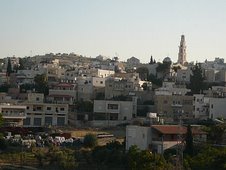
my new town
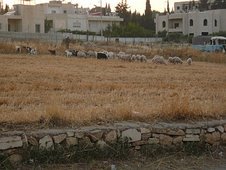
just a 5 minute walk from my house
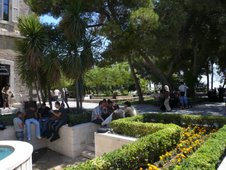
Bethlehem University

Bethlehem Univerity
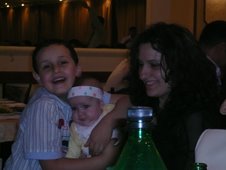
John, Jessi, Jumana
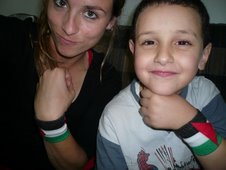
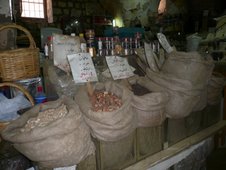
in Nablus
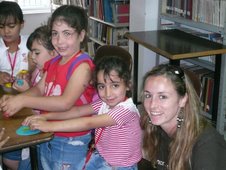
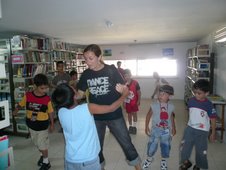
Beit Jala Breakerz (BJB)
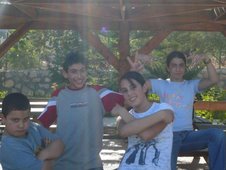
Beit Jala
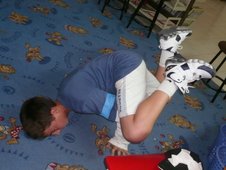
Nader
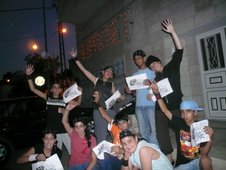
Beit Jala Breakerz
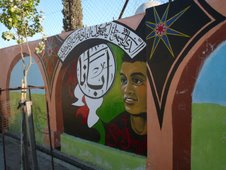
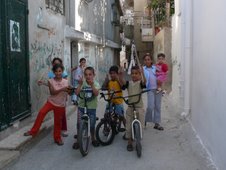
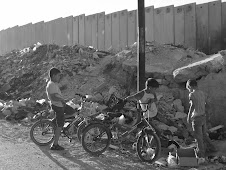
(stolen from philip's photos)
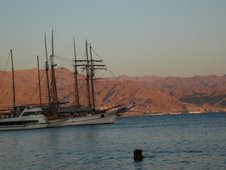
look off into Jordan...
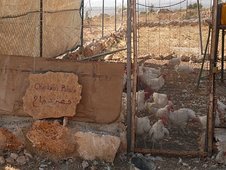
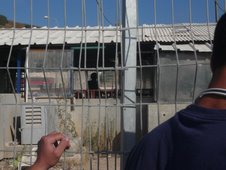
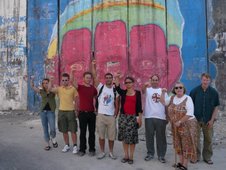
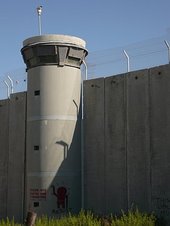
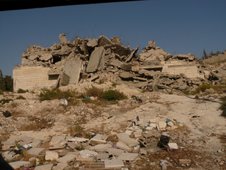
East Jerusalem
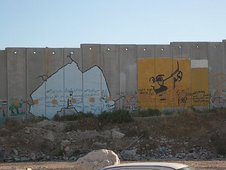
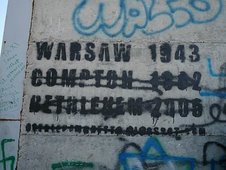
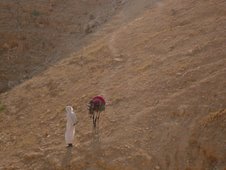
Bedouin in the desert
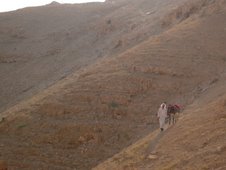
hike to Jericho
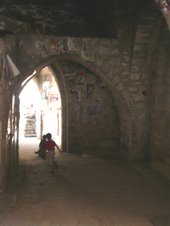
medinat qadime
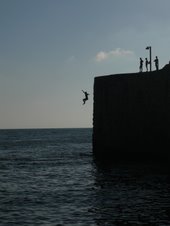
in Akka
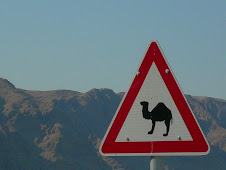
Ein Gedi
Roz travels to Palestine in the summer of 2007 and then returns the next summer in 2008. This is the documentation of her experiences.
[2008] Beit Sahour from the walk down from Manger Square
![[2008] Beit Sahour from the walk down from Manger Square](http://1.bp.blogspot.com/_hOZLO5Y4idk/SK9wy1w8QWI/AAAAAAAAAGw/EuD6_ztPt7Q/S150/me+with+beit+sahour+in+background.jpg)
[2008] Al Quds
![[2008] Al Quds](http://1.bp.blogspot.com/_hOZLO5Y4idk/SLCa7iScnjI/AAAAAAAAAG4/E4YEqk21J8c/S150/the+quds.jpg)
View of the Dome of the Rock from our hostel at 6am
[2008] People praying at the Wailing Wall (also called the Western Wall)
![[2008] People praying at the Wailing Wall (also called the Western Wall)](http://3.bp.blogspot.com/_hOZLO5Y4idk/SLCcI--VHHI/AAAAAAAAAHY/LStdZhG39nc/S150/western+wall.jpg)
In the Old City of Jerusalem
[2008] Entrance to Aida Refugee Camp
![[2008] Entrance to Aida Refugee Camp](http://2.bp.blogspot.com/_hOZLO5Y4idk/SLU9NI6S5SI/AAAAAAAAAHg/moSJFQdXRiY/S150/entrance+to+aida+camp.jpg)
in Bethlehem
[2008] Grafitti on the Separation Wall near Aida Camp
![[2008] Grafitti on the Separation Wall near Aida Camp](http://3.bp.blogspot.com/_hOZLO5Y4idk/SLU-JasGTcI/AAAAAAAAAH4/vJBh7DvXAws/S226/mohammed+ali.jpg)
[2008] Banksy
![[2008] Banksy](http://2.bp.blogspot.com/_hOZLO5Y4idk/SK9s7puCQJI/AAAAAAAAAGA/M17-TVFbzdY/S150/banksy+balloon+girl.jpg)
At Kalandia Checkpoint (near Ramallah)
[2008] Abandoned "castle"
![[2008] Abandoned "castle"](http://1.bp.blogspot.com/_hOZLO5Y4idk/SK9s2AzfQrI/AAAAAAAAAF4/7z4-czfFi2I/S150/castle+big+view.jpg)
Beit Jala
[2008] Abandoned "castle"
![[2008] Abandoned "castle"](http://4.bp.blogspot.com/_hOZLO5Y4idk/SK9sldyh0gI/AAAAAAAAAFw/Ify5IVa-2EA/S226/castle+1.jpg)
Exploring the inside of the bullet-ridden shell of a house, a casualty of the 2nd Intifada
[2008] Kids in Balata Refugee Camp
![[2008] Kids in Balata Refugee Camp](http://2.bp.blogspot.com/_hOZLO5Y4idk/SK9sNr8ybVI/AAAAAAAAAFo/LMF4TEFNDaI/S150/balata+kiddos.jpg)
We passed them while they were playing soccer and they began posing for photos
[2008] West Bank License Plate
![[2008] West Bank License Plate](http://4.bp.blogspot.com/_hOZLO5Y4idk/SKtDu7FLMsI/AAAAAAAAAFQ/PVx6B-SJotQ/S150/Pal+license.jpg)
This car is not allowed on the Israeli roads in the West Bank
[2008] En route to Jenin
![[2008] En route to Jenin](http://2.bp.blogspot.com/_hOZLO5Y4idk/SLU91ig86-I/AAAAAAAAAHw/Rpl6BbDUp6k/S150/en+route+to+jenin.jpg)
[2008] Jenin Refugee Camp
![[2008] Jenin Refugee Camp](http://3.bp.blogspot.com/_hOZLO5Y4idk/SKtDljrTQ4I/AAAAAAAAAFI/P7Bnk7-yb-Q/S150/jenin+horse.jpg)
Artwork
[2008] JFC
![[2008] JFC](http://1.bp.blogspot.com/_hOZLO5Y4idk/SLU9aWlw5vI/AAAAAAAAAHo/p_Ado7Oja7k/S150/jenin+fried+chicken.jpg)
(Jenin Fried Chicken)
[2008] Peace Cycle
![[2008] Peace Cycle](http://3.bp.blogspot.com/_hOZLO5Y4idk/SKtDXLctXAI/AAAAAAAAAFA/xyKyZ7olNNk/S150/peace+cycle.jpg)
Nora & Dante join for a leg of the journey
[2008] Jenin Refugee Camp
![[2008] Jenin Refugee Camp](http://3.bp.blogspot.com/_hOZLO5Y4idk/SKtDHnDP5YI/AAAAAAAAAE4/JyuIZwIwXQU/S150/boy+in+jenin.jpg)
A young boy bikes past a mural
[2008] Graffiti in Balata Camp
![[2008] Graffiti in Balata Camp](https://blogger.googleusercontent.com/img/b/R29vZ2xl/AVvXsEh-q4ZgsDOU0IbDBgoJBEZu0I8mfGsjmIZmYSkDmDVSWyMHpAG2itxsfYSe0yGvWZ_fwlGR0y5FJcbWbTLbFkLlExyNdVnhZtaNiHo3fber1ogav2U_qH1QxxTV4YH1xomznmxatoPTlw/s150/unity.jpg)
Outside the youth center
[2008] Beit Jala Breakerz
![[2008] Beit Jala Breakerz](http://2.bp.blogspot.com/_hOZLO5Y4idk/SKn5r9Z7TtI/AAAAAAAAAEo/6anCSR_aha0/S150/bboy+stance.jpg)
Some of our group in our bboy/bgirl stances!
[2008] Some of the Beit Jala Breakerz
![[2008] Some of the Beit Jala Breakerz](http://2.bp.blogspot.com/_hOZLO5Y4idk/SK9voJ20ruI/AAAAAAAAAGg/6fFtJbP0o38/S150/BJB+group.jpg)
[2008] Hawara Checkpoint
![[2008] Hawara Checkpoint](https://blogger.googleusercontent.com/img/b/R29vZ2xl/AVvXsEjJ1vlNjSB7pzHDcGsJfsgH1GzmbjHhIzJH6o2gmLbD9GyT0MTTLPt7w72UbJ7Tmt7PJ6uXoyAg0hKOuvwkzVRXTO-y9RWELkZtLlPRdiUok1-Mzq4fy5pIgE1h8vAo_y07ccabwga14g/s150/checkpoint.jpg)
In our way as we leave the Nablus area heading back to Bethlehem
[2008] Main street in Balata Refugee Camp
![[2008] Main street in Balata Refugee Camp](http://2.bp.blogspot.com/_hOZLO5Y4idk/SKn2Rh8wASI/AAAAAAAAAEY/QoB1RcuKu-M/S150/balata+street.jpg)
[2008] Balata-Cucumber Vendor
![[2008] Balata-Cucumber Vendor](http://3.bp.blogspot.com/_hOZLO5Y4idk/SK9vcBDx_YI/AAAAAAAAAGY/ZJvKzdmdt0w/S150/balata+cucumber+seller.jpg)
[2008] Main street in Mochaim Balata (Refugee Camp)
![[2008] Main street in Mochaim Balata (Refugee Camp)](http://1.bp.blogspot.com/_hOZLO5Y4idk/SK5JuA3ENBI/AAAAAAAAAFg/nxDYqj_xdWw/S150/main+street+balata.jpg)
[2008] Balata Refugee Camp kids
![[2008] Balata Refugee Camp kids](http://2.bp.blogspot.com/_hOZLO5Y4idk/SK5JhdrsTAI/AAAAAAAAAFY/Y5v5DV-nbfY/S150/kids+in+balata.jpg)
[2008] A little boy in Balata Refugee Camp
![[2008] A little boy in Balata Refugee Camp](https://blogger.googleusercontent.com/img/b/R29vZ2xl/AVvXsEhKao9prUR5VDyEvaq-U-6leJ8DAeZLutTUDigDP6OMnz3l7e9KotiDGPtq5oh9wBBKA2jyqMVCCOjLYsQDzgtJLn66OEc3WisZG_565Sypl9UVjw63qLIT4uodnqHQ4vBUL6BwE5MP3Q/s150/balata.jpg)
[2008] Kids in Balata
![[2008] Kids in Balata](http://2.bp.blogspot.com/_hOZLO5Y4idk/SK9vUfZr5UI/AAAAAAAAAGQ/1ZU-MSu48P4/S150/balata+grass+boy.jpg)
[2008] Dead Sea
![[2008] Dead Sea](http://2.bp.blogspot.com/_hOZLO5Y4idk/SKn0eXgZxzI/AAAAAAAAAEI/5-36JnNeJgE/S150/dead+sea.jpg)
Nora and I covered in dead sea clay
[2008] Mahmoud Darwish Funeral
![[2008] Mahmoud Darwish Funeral](https://blogger.googleusercontent.com/img/b/R29vZ2xl/AVvXsEj2rK7dSc0G-TFnE8J8P5klU-JFtRgDRr3QzfOVC8Gj98uSafvRX60Jt7EFErRXaCsMwoct3rNZk1Kjji6ZA9qeWZry5cvMJAZHYnN24MCbAFPdJZrw_splK68P2pgVlKQAPjs4OZfgAg/s150/crowd_at_Darwish_grave.jpg)
The crowd pushes forward to catch a glimpse of the poet's grave
[2008] Fun with Fez
![[2008] Fun with Fez](http://1.bp.blogspot.com/_hOZLO5Y4idk/SKYM2OVszaI/AAAAAAAAADg/ElhZmDXZwk4/S150/Fun+with+Fez.jpg)
At Alaa's shop in Bethlehem
[2008] Banksy
![[2008] Banksy](https://blogger.googleusercontent.com/img/b/R29vZ2xl/AVvXsEjev3pXsGPsumHctBRUJN3P3iqQWbjKHJ8voNbi7AkRpwkoud1Lx0VcAUZpohVAL-hsSgJmtKkNxW5ZyR-QGNbOdaMfpmfXTWSum06hnql9DKX8RRaAsaj9lMl8_MV5EQbnaMaOWRmu5A/s150/Heidi_banksy.jpg)
painted at the gas station in Beit Sahour
Beit Sahour

my new town
Shepherd in his fields

just a 5 minute walk from my house
Jama' Beit Lahem

Bethlehem University
Our Arabic Class

Bethlehem Univerity
Host Family

John, Jessi, Jumana
Me and John

Spices

in Nablus
Volunteering at the Beit Jala Library

Teaching breaking

Beit Jala Breakerz (BJB)
Bboy/Bgirl pose

Beit Jala
Bboy in Beit Jala

Nader
BJB

Beit Jala Breakerz
David's Mural

Kids at Aida Refugee Camp

Kids from Aida Camp at the Wall

(stolen from philip's photos)
The Red Sea from Eilat

look off into Jordan...
Chicken's Palace

Checkpoint on the way to Nablus

Group at The Wall

Wall watchtower

Demolished house

East Jerusalem
Banksy Wall grafitti

Wall grafitti

Wadi Kalt

Bedouin in the desert
Wadi Kalt... again....

hike to Jericho
Nablus

medinat qadime
Jumping into the Mediterranean

in Akka
Camel Crossing

Ein Gedi
![[2008] Figs](https://blogger.googleusercontent.com/img/b/R29vZ2xl/AVvXsEh5bpIASKvOr7C6eJpKh3GnpEWCJml8ydXoePi2Ph1ixI4eQg62puyfqER8phchIhFFkA-q-gL_cD78MxmmNRxMAgnv2x-ezeXtUzWEgcyt7ipKCACOGcQISLhTQ8DnKTfmdN2ZS-RXjw/s150/figs.jpg)
![[2008] Map of the West Bank](https://blogger.googleusercontent.com/img/b/R29vZ2xl/AVvXsEhMgTY8cj9lojnFgOYdBRCXQxR9W-348w6k3lZ5ClXDiOayw6V_H2dYcWEKIZmTLNmy7qE6wIH07qIP531TbMkmxVcXvIZxcAEbgO7RA9d7cYWfg6BMHFpWuZM_Y4nLF1X8FkACGCwKgA/s226/map.jpg)
No comments:
Post a Comment